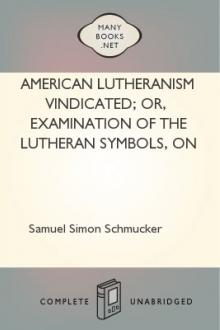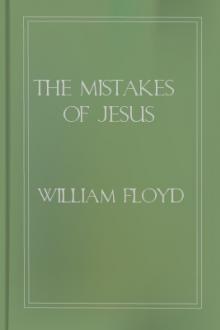Genre Philosophy. Page - 2
No registration or authorisation! And it is all for free!

'to live in love with Onas'--as they called him--'and with the children of Onas, as long as the sun and the moon shall endure.' 'This treaty of peace and friendship was made,' as Bancroft says, 'under the open sky, by the side of the Delaware, with the sun and the river and the forest for witnesses. It was not confirmed by an oath; it was not ratified by signatures and seals; no written record of the conference can be found; and its terms and conditions had no abiding monument, but on the

hon, in Loci Communes, or system of Divinity, peace, love, joy, testimony of the Spirit, fruits of the Spirit, and not any outward rite-Sacraments therefore only mediate and not immediate conditions of pardon-proofs, Mosheim, Reinhard, Knapp. CHAPTER IX. BAPTISMAL REGENERATION.....135 Is taught in Symbolical books and by the Reformers and early Theologians, Hunnius, Gerhard, Buddeus. Influ

was in China the LORD wanted me. It seemed to me highly probable that the work to which I was thus called might cost my life; for China was not then open as it is now. But few missionary societies had at that time workers in China, and but few books on the subject of China missions were accessible to me. I learned, however, that the Congregational minister of my native town possessed a copy of Medhurst's China, and I called upon him to ask a loan of the book. This he kindly granted, asking me

cording to which this kind of instruction should be imparted. At the outset, however, we are confronted by what certainly is a grave difficulty, and to many may appear an insuperable one. The opinion is widely held that morality depends on religious sanctions, and that right conduct can not be taught--especially not to children--except it be under the authority of some sort of religious belief. To those who think in this way the very phrase, unsectarian moral teaching, is suspicious, as

al or tutelary, others Dissocial or Self-regarding. Dispositions.The consequences of a mischievous act. Punishment. Private Ethics(Prudence) and Legislation distinguished; their respective spheres.MACKINTOSH. Universality of Moral Distinctions. Antithesis or Reasonand Passion. It is not virtuous acts but virtuous dispositions that outweigh the pains of self-sacrifice. The moral sentiments havefor their objects Dispositions. Utility. Development of Consciencethrough Association; the constituents

west? He often asked himself that question in some amusement as they approached the coast of China. They entered a long winding channel and steamed this way and that until one day they sailed into a fine broad harbor with a magnificent city rising far up the steep sides of a hill. It was an Oriental city, and therefore strange to the young traveller. But for all that there seemed something familiar in the fine European buildings that lined the streets, and something still more homelike in that

nd Joseph took Jesus to Jerusalem openly soon after the supposed decree.[2]There is dispute as to whether Jesus was born in Bethlehem or Nazareth, and the date of his birth has been placed anywhere from 4 B.C. to 7 A.D. Matthew says that Jesus was born "in the days of Herod", while Luke says it was "When Cyrenius was governor of Syria." Herod died in 4 B.C., while Cyrenius did not become governor of Syria until 7 A.D. The romantic story of the Christ-child is not

ou," says Christ, "that he will avenge them speedily."But now, forasmuch as this parable reacheth not (so directly) thepoor Publican in the text, therefore our Lord begins again, and addsto that other parable, this parable which I have chosen for my text;by which he designeth two things: First, The conviction of the proudand self-conceited Pharisee: Secondly, The raising up and healing ofthe cast down and dejected Publican. And observe it, as by the firstparable he chiefly

hile life as a whole, history, character, and destiny are objects unfit for imagination to dwell on, and repellent to poetic art? I cannot think so. If it be a fact, as it often is, that we find little things pleasing and great things arid and formless, and if we are better poets in a line than in an epic, that is simply due to lack of faculty on our part, lack of imagination and memory, and above all to lack of discipline.This might be shown, I think, by psychological analysis, if we cared to
